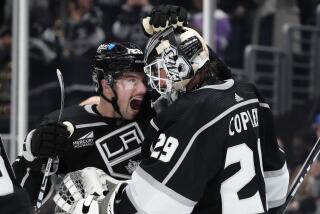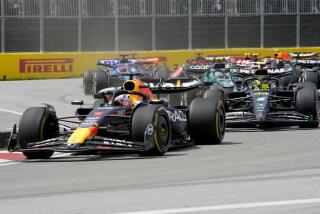STANELY CUP FINALS : Trade That Isn’t Pays Off Big for Canadiens : Most valuable player: Savard ignores fans’ pleas to send Roy elsewhere and keeps winner of Conn Smythe Trophy.
- Share via
MONTREAL — To his right, to his left, above him and behind him, the Forum bubbled in a mass of red banners and wild cheers as the clock ticked off the final seconds of the Montreal Canadiens’ 24th Stanley Cup triumph.
The game had long since been claimed by the Canadiens, whose 4-1 lead was an unbridgeable chasm for the exhausted Kings. And, although the noise grew loud enough to awaken the ghosts that haunt the venerable building, goaltender Patrick Roy remained vigilant, playing each shot as if the Canadiens’ season rested on his tensed shoulders.
Not until 10 seconds remained did Roy join the celebration and fling his arms in the air, embracing the moment and letting go his bitter memory of Montreal’s 1989 Stanley Cup final loss to Calgary.
“It was a bad feeling that year,” he said. “We were two games short from the Stanley Cup, but we weren’t as hungry as we were this year. We didn’t pay the price like we did this year.”
The price for Roy was high. It included enduring the uncertainty of trade rumors and watching his goals-against average balloon to 3.20 as Montreal revamped its defense. The payoff came Wednesday, when the Canadiens finished off the Kings in five games to win their first Cup since 1986, and Roy won the Conn Smythe Trophy as the most valuable player in the playoffs--just as he did in 1986.
“He did everything that was asked of him and more,” said Kelly Hrudey, his King counterpart. “Everybody knows Roy was more spectacular than he was in ‘86, when he won the Conn Smythe. I’ve admired him for years. He brings to the game a level of consistency no goaltender in my era has shown.”
Roy’s moment of triumph arrived at the end of a momentous 10 days that included the birth of his third child after Game 1 and the celebration of his third wedding anniversary on Wednesday. He became the fifth player to win the Conn Smythe twice, joining Boston’s Bobby Orr (1970 and ‘72); Philadelphia goaltender Bernie Parent (1974-75); Wayne Gretzky, who won it with Edmonton in 1985 and ‘88, and Mario Lemieux, the winner with Pittsburgh in 1991 and ’92.
His 16-4 record and 2.13 postseason goals-against average--which included a record overtime shutout streak of 96 minutes 39 seconds--only hint at his contribution to Montreal’s Cup triumph.
“He was our quiet leader, and if not for him, we wouldn’t be here,” defenseman Jean-Jacques Daignault said. “He was unbelievable. He kept us in every series from the beginning. In overtime, we just had so much confidence in him.”
Roy’s confidence wavered this season after readers polled by a Montreal newspaper declared he should be traded. Assurance faltered again after the Canadiens lost the first two games of their first-round series to the Quebec Nordiques, but it returned against Buffalo, the New York Islanders and the Kings. He gave up only 11 goals against the Kings in 315 minutes.
“It was tough at the time, because even if I wasn’t playing well, I had my mind on the game and I was working as hard as I could to help my team to win,” Roy said of the poll. “But when the playoffs started, Jacques (Demers, Montreal’s coach) made sure we were ready against Quebec. The turning point was when we started to believe we could do something good and we beat the Nordiques. . . .
“In ‘86, there were no expectations. Everything we did was just great. If we beat Boston in three, great. Then we beat Hartford and the Rangers and it was a great summer. This year was different. If we lose against Quebec, it would be a bad summer and Patrick Roy would probably be a part of a trade. I don’t want to be traded. I don’t want to leave Montreal.”
General Manager Serge Savard isn’t ushering him out the door. “I get a lot of suggestions about trading players. People wanted me to trade Patrick Roy, and they wanted me to trade John LeClair,” Savard said, referring to the young winger who scored the overtime winners in Games 3 and 4. “If I (went along with) those decisions and trade them, I lose my job.”
More to Read
Go beyond the scoreboard
Get the latest on L.A.'s teams in the daily Sports Report newsletter.
You may occasionally receive promotional content from the Los Angeles Times.







